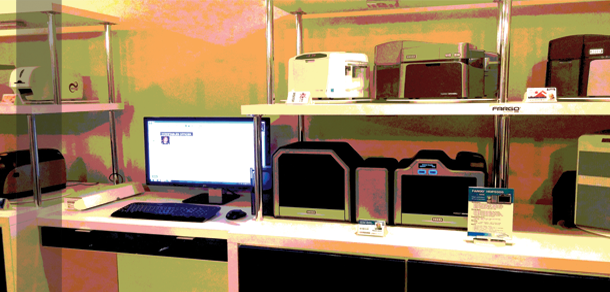Corporations benefit outsourcing employee ID card production
Issuance as a service: snap a photo, upload data, receive cards via mail
29 March, 2016
category: Corporate, Government, Smart Cards
For a small business like Guaranteed Subpoena Service, hiring an outside company to issue its ID badges is a no brainer.
The Union, N.J.-based process serving company pays about $6 to print each ID and gets free shipping. With about 30 employees, it costs $180 to print all of the badges, compared to a card printer that would cost more than 10 times as much. “We can’t justify paying $2,000 for a machine when they’re charging $6 front and back for an ID. You just can’t beat the price,” says John Metta, chief technology officer at the company.
Guaranteed Subpoena Service joins a growing number of small and medium size companies that are opting to outsource their ID card issuance instead of doing the job in house. Smaller businesses like the simplicity of being able to farm out the job because they don’t have to worry about buying and maintaining issuance equipment and software, stocking card supplies onsite and paying employees to handle the work.
Outsourcing card production, sometimes called ID as a service, has many meanings. It can simply refer to the outsourcing of physical card production or it can extend all the way through the onboarding, lifecycle management and revocation of employee privileges.
“Small to medium sized companies generally need smaller volumes of cards, so there is value to allowing somebody else to manage that service for them. Not having the employee overhead and training is attractive,” says Josh Nippoldt, senior product marketing manager for HID Global, which offers ID on-demand services.
For companies that opt to obtain their cards through a vendor or service bureau, the first step is to determine the information to include on the card. From there, companies work with the vendor to develop a card design. Next, the company uploads cardholder data, the vendor creates a proof and finally cards are produced and distributed.
Business cites improved issuance
Until last year, Guaranteed Subpoena Service issued all of its ID badges in house. But when the employee in charge of the task left the company, Metta started exploring other options. The company contracted with IDSecurityOnline to issue the ID cards.
Metta says he chose the offsite printing option because of the substantial cost savings. But there are other benefits as well.
One of these benefits is that the badges have a more professional appearance than they did when the company was doing all of its badging in-house, says Metta. It’s also easy to order a single badge when the company makes a new hire, rather than fire up an in-house system and try to remember how to make it all work, he says.
To create an ID, Metta takes the employee’s picture, generates a unique employee bar code and places them into a template. He exports a jpeg file and emails it to the vendor for production. From there, IDSecurityOnline prints the badge or badges and mails them back to within a day.
Though the company primarily sells card printers, they saw a need for offsite ID issuance as a service, says Gabriel Schonzeit, president and founder of IDSecurityOnline. The New York-based company offers 24-hour turnaround time to clients within a three-state range.
Although smaller companies like Guaranteed Subpoena Service use IDSecurityOnline as their primary source for ID issuance, Schonzeit says it’s also common for the company to serve in a hybrid capacity, providing the service as a value add for clients that have their own printers.
Schonzeit says there’s a growing willingness among businesses to upload employee data, which creates a market for ID issuance as a service. “The cloud is becoming a trusted environment,” he says.
There is a growing willingness among businesses to upload employee data to the cloud, which creates a market for ID issuance as a service
ID cost savings, simplicity touted
Issuers cite multiple advantages for outsourcing ID production. Schonzeit says the model can be a revenue generator in addition to a cost saving measure. For example, a university might ask its incoming students to pre-enroll in the ID system by entering their data and submitting a photo. Instead of having to buy multiple printers to produce cards for the entire student body at the start of a semester, the campus can print most IDs offsite. Students who don’t pre-enroll could be charged a fee to have the ID printed on site.
Outsourcing also helps companies make ID printing into a smaller, monthly operating expense instead of the large, up-front capital expense that stems from the traditional model of purchasing issuance equipment. “With a service model, it’s a higher per-card cost but a consistent cost spread over time,” Nippoldt says.
Offsite issuance is also ideal for businesses that have multiple sites in different parts of the country and would otherwise need to distribute hardware to each location.
Entrust Datacard supplies the equipment and software that enables card production and remote provisioning of secure credentials. Tim Klabunde, the firm’s director of Government Identification Solutions, says there are advantages for both the public and private sector entities to utilize a service bureau approach. They don’t have the overhead or operations to worry about, and they typically pay a per-badge price.
“You have the flexibility of higher efficiency equipment, the ability to make smaller runs and you can manage a lot of different programs without having to warehouse cardstock or manage the supplies,” he says.
Concerns about security, logistics
The outsourcing model is not without its risks, and protecting cardholder data while it’s in transit to and from a third party should not be taken lightly, Schonzeit says. “The pre-enrollment side of things can be scary – what if the wrong person the gets the ID?” he asks. “You have to be very careful with service bureau work.”
Although Schonzeit believes in ID as a service, he still says in-house issuance remains the most secure option for businesses. “I would prefer for a person to purchase a designated computer and photo ID printer that’s only used for the printing of IDs internally. That is still my preference from a security standpoint, but in many cases outsourcing makes sense,” he says.
There are also some logistical challenges that stem from having an outside vendor take over ID issuance. Outsourcing can create challenges for a business that needs to print cards on demand, Klabunde says. A company might not be able to issue replacement badges as quickly and easily. “You have to make sure you have a badge ready for someone who shows up to work on Monday,” Klabunde says.
Despite any drawbacks of outsourcing, Nippoldt believes the market is shifting toward the ID as a service model, especially among small and medium size businesses. “Smaller companies are starting to utilize the model because – for the first time – they’re seeing the value in having cards, versus not having cards,” he says.




